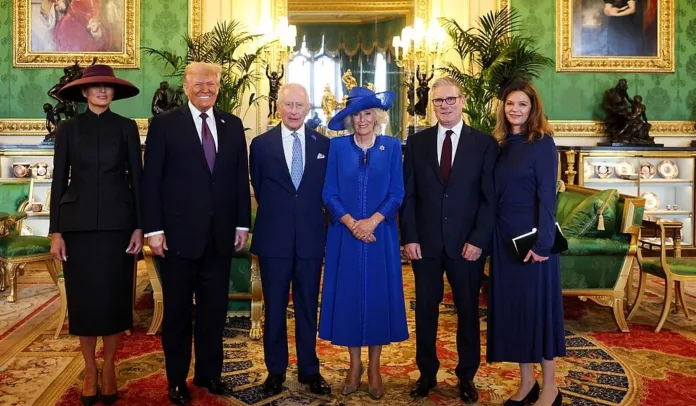Trump basks in royal pageantry, but Epstein scandal and Gaza talks cast a dark shadow
Donald Trump’s second state visit to the United Kingdom unfolded with grandeur, gilded pageantry and a royal banquet at Windsor Castle, but the sheen of celebration may quickly tarnish as political battles and the lingering Epstein scandal shadow his trip.
The US president arrived at Windsor in full pomp, greeted by King Charles and Queen Camilla before a golden carriage ride through the estate alongside the monarch. The day brimmed with ceremony: brass bands, pipers, and a dramatic Red Arrows fly-past after rain scuppered plans for a joint F-35 display. Trump and his wife, Melania, paid tribute with a wreath at the tomb of Queen Elizabeth II, revisiting memories of his 2019 state visit.
Inside St George’s Hall, Trump toasted the King with unrestrained praise for the British empire and its enduring link to the United States. He called the relationship “irreplaceable and unbreakable,” insisting the two nations had “done more good for humanity than any two countries in all of history together.”
King Charles, more measured, commended Trump’s personal efforts at diplomacy in Ukraine and Gaza. His speech also carried quiet warnings. He urged unity against “tyranny once again threatening Europe” and emphasised the Aukus submarine pact—an agreement struck under Joe Biden now under Trump’s review. Though he avoided the phrase “climate change,” the King dedicated much of his address to environmental preservation, a topic the president has long resisted.
Embed from Getty ImagesThe guest list reflected the fusion of politics and power. Apple’s Tim Cook sat beside Tiffany Trump, while Blackstone chief Steve Schwarzman dined alongside Prime Minister Sir Keir Starmer. King Charles was flanked by Marco Rubio, the US secretary of state, and Queen Camilla by Scott Bessent, the US Treasury secretary. Also in attendance were Rupert Murdoch, Nvidia’s Jensen Huang, OpenAI’s Sam Altman and Citigroup’s Jane Fraser.
The menu itself—organic Norfolk chicken ballotine wrapped in courgettes—offered a refined backdrop to a room filled with some of the most powerful figures in business and government.
Yet the real tests lie beyond the royal halls. Trump is set for talks with Starmer at Chequers, where discussions on Gaza, Ukraine and Palestinian statehood promise uncomfortable exchanges. Starmer has pledged to recognise Palestine later this month, a move Washington opposes. Any joint press conference is likely to bring pointed questions.
Adding to the pressure, new revelations about convicted paedophile Jeffrey Epstein continue to ripple through Washington and London. Trump’s past ties to Epstein have resurfaced with sharper scrutiny, threatening to overshadow diplomacy. Starmer himself has already felt the fallout, forced to sack Lord Peter Mandelson as ambassador to Washington over his own links to the disgraced financier.
Downing Street is keen to steer attention back to economics, flagging a £150bn wave of US investment. Blackstone is committing £100bn over a decade, including a data centre in north-east England. Prologis is injecting £3.9bn into UK life sciences and manufacturing, while Palantir is spending £1.5bn to bolster Britain as a defence innovation hub. Chancellor Rachel Reeves will chair a business roundtable in hopes that trade can bind the allies amid political rifts.
For Trump, the Windsor banquet may be remembered as the zenith of this visit: gilded halls, royal praise and a monarch’s nod to his global ambitions. Yet the shadow of Chequers looms. With Gaza raging, Ukraine unresolved, and Epstein’s name never far from the headlines, the president’s triumph could soon turn into a confrontation he cannot charm his way out of.
